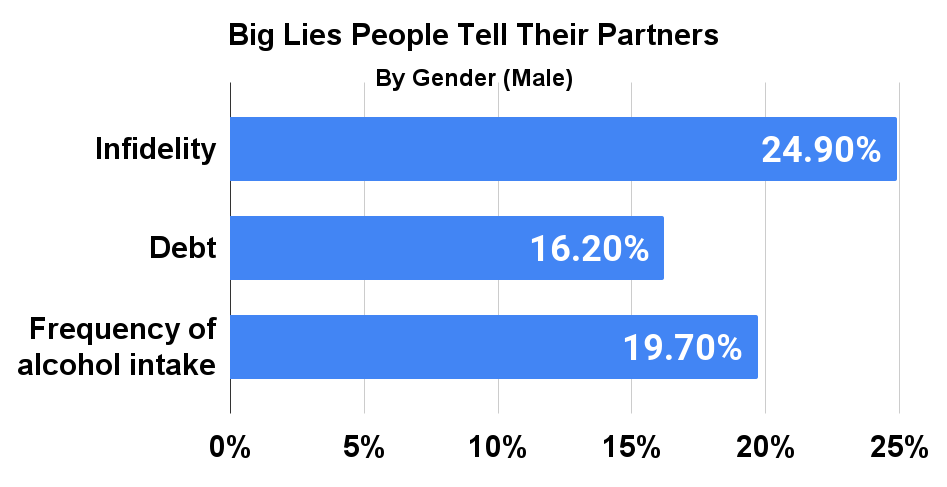How To Tell If Your Husband Is Lying About Money?
Discovering financial secrets can shake the very foundation of a relationship, leaving you feeling lost and unsure. It’s a situation many people quietly face, wondering if their partner is truly open about the household finances. This kind of worry, you know, can keep you up at night, creating a real strain on trust.
Money, in a marriage, often acts like a sensitive topic, and it's almost a common area where disagreements or misunderstandings pop up. When one person starts to hide financial details, it can feel like a deep betrayal. That feeling, you see, is something nobody wants to experience.
This article aims to help you spot the signs if your husband is, perhaps, not being entirely straightforward with money matters. We'll look at behaviors and clues that might suggest something is off, so you can approach the situation with more clarity, and maybe, just maybe, find some peace of mind.
Table of Contents
- Understanding Financial Transparency in Relationships
- Subtle Shifts in Behavior
- Digital Clues and Paper Trails
- Inconsistent Stories and Evasiveness
- Unexpected Financial Changes
- Addressing Your Concerns
- Frequently Asked Questions
Understanding Financial Transparency in Relationships
In a healthy partnership, sharing financial details is, you know, pretty standard. It means both people are open about their income, their debts, and how they spend money. This openness helps build a strong foundation of trust, which is really important.
When someone starts to conceal financial information, it can feel like a major breach. This act of hiding, to tell you the truth, goes against the idea of partnership. It suggests that one person is keeping things from the other, and that's a problem.
Recognizing what financial transparency looks like can help you spot when it’s missing. It’s about knowing what to expect, so you can tell if something is off. You want to see all the cards on the table, basically.
Subtle Shifts in Behavior
Sometimes, the first signs of financial dishonesty aren't about numbers at all; they are, in fact, about how a person acts. These behavioral changes can be quite subtle, so you need to pay attention. They might seem small, but they can add up, you know.
Avoiding Money Talk
One common sign is when your husband suddenly starts to avoid conversations about money. Where you once discussed budgets or future plans, he might now change the subject. It's almost as if he doesn't want to engage, which is a bit strange.
If you bring up bills or savings, he might, you know, become quiet or say he's too busy. This evasion, basically, is a red flag. It suggests there's something he doesn't want to discuss, or perhaps, something he doesn't want to tell.
He might get annoyed or frustrated when you try to talk about finances. This reaction, you see, is often a way to shut down the conversation. It's a method, really, to keep you from asking more questions.
Unusual Secrecy
Another indicator is an increase in general secrecy around financial documents or online accounts. He might start keeping bank statements out of sight, or, perhaps, become very private with his phone or computer when dealing with money. This kind of behavior, you know, is quite telling.
He might suddenly clear his browser history more often or guard his screen. This behavior, in a way, suggests he's trying to conceal something. It's like he's trying to make sure you don't discover any financial details.
If he used to share account access or passwords, and now he doesn't, that's also a sign. This change, you see, points to a desire for concealment. He's not revealing things he once did, which is a concern.
Changes in Spending Habits
Noticeable shifts in how money is spent can also be a clue. Maybe there's less money than there should be, or he's making purchases you don't recognize. This could be anything from new items appearing to money just disappearing, you know.
He might have new hobbies that seem expensive, or he's going out more often than before. These activities, you know, can cost money. If he's not explaining where the funds come from, that's a point to consider.
On the other hand, he might suddenly become overly frugal, perhaps, more than usual. This could be a way to compensate for hidden spending or debt. It's a change in pattern, basically, that might mean something.
Digital Clues and Paper Trails
In our modern world, money matters often leave digital footprints or paper trails. These records, you see, can reveal a lot if you know what to look for. They are, in a way, like breadcrumbs leading to the truth.
Hidden Accounts or Mail
Keep an eye out for mail addressed to him that seems unfamiliar, or perhaps, comes from financial institutions you don't recognize. These could be statements for accounts you don't know about. It's a tangible sign, you know, of something new.
He might start intercepting the mail, or, perhaps, opening it before you see it. This behavior, basically, is about controlling information. He doesn't want you to discover what's inside.
Similarly, look for new email notifications from banks or credit card companies. If he's getting these, and you're not aware of the accounts, that's a big clue. It's a way to tell if new financial dealings are happening.
Unexplained Transactions
Reviewing joint bank statements, if you have access, can sometimes show unusual transactions. Look for large withdrawals without clear explanations, or, perhaps, payments to unknown entities. These can be, you know, very telling.
Small, frequent cash withdrawals can also be a sign. These are often harder to track than large ones. They can add up, you see, without leaving a clear trail of where the money went.
If you see transfers to accounts you don't recognize, or, perhaps, payments to online services you've never heard of, those are worth investigating. They might be revealing something important.
New Passwords or Device Secrecy
A sudden change in his phone or computer habits can be a sign. If he starts using his devices more secretly, or, perhaps, changes passwords without telling you, that's a concern. He might be trying to keep you from seeing something, you know.
He might take his phone everywhere, even to the bathroom, or, perhaps, get upset if you touch his laptop. This behavior, you see, is about guarding access. He doesn't want you to stumble upon anything.
If he used to leave his financial apps open, and now he closes them immediately, that's a shift. This change, basically, suggests he's trying to conceal something. He's being more careful, perhaps, about what you might discover.
Inconsistent Stories and Evasiveness
When someone is hiding financial truths, their stories about money might start to unravel. They might give conflicting details, or, perhaps, just be vague. This kind of communication, you know, is a sign of something being off.
Vague Answers About Money
If you ask about a specific bill or a recent expense, and he gives you a general or unclear answer, that's a point to notice. He might say things like, "Oh, it's handled," or, perhaps, "Don't worry about it." These are, in a way, evasive responses.
He might avoid giving specific numbers or dates when you ask. This lack of detail, you see, is a common tactic for someone trying to conceal information. He doesn't want to tell you the precise facts.
Sometimes, he might change his story about how much something cost or where money went. These inconsistencies, basically, are a big indicator. They reveal that he's not being truthful, or perhaps, not remembering his own lies.
Blaming Others or External Factors
A person who is lying might try to shift the blame when questioned about money problems. He might say, "The bank made a mistake," or, perhaps, "My boss messed up my paycheck." This is a way, you know, to deflect responsibility.
He might attribute financial issues to vague external forces, like "the economy" or "unexpected costs," without offering specifics. This kind of excuse, you see, is often a smokescreen. He doesn't want to tell you the real reason.
If he constantly points fingers at others for financial shortfalls, that's a sign. It's a way to avoid taking ownership, basically. He's not revealing his own part in the situation.
Getting Defensive
When confronted about money, a husband who is hiding something might become very defensive or angry. He might accuse you of not trusting him, or, perhaps, of being too nosy. This reaction, you know, is often a sign of guilt.
He might turn the conversation around, making you feel bad for asking. This tactic, you see, is meant to shut down your questions. He wants you to stop trying to discover the truth.
If he reacts with disproportionate anger to a simple question about a bill, that's a big clue. This kind of emotional response, basically, can indicate he's trying to conceal something significant. He's not ready to tell you what's going on.
Unexpected Financial Changes
Sometimes, the signs are not just behavioral but also tangible financial shifts. These changes can be quite alarming, you know, and often point to a deeper issue. They are, in a way, hard to ignore.
Sudden Debt or Missing Funds
A sudden appearance of new debt that you weren't aware of is a major red flag. This could be credit card statements arriving for cards you didn't know existed, or, perhaps, collection calls. These are, you know, very clear signs.
If money that was supposed to be in a joint account or savings suddenly isn't there, that's a serious concern. It's almost as if funds have just vanished. You need to tell yourself to investigate this, basically.
Perhaps bills that were always paid on time are now late, or, perhaps, you're getting notices about overdue payments. This indicates a problem with cash flow, which could be from hidden spending or debt. It's a sign that something is amiss.
Decreased Savings or Investments
If you notice that joint savings accounts or investment portfolios are shrinking without a clear explanation, that's a significant issue. He might have withdrawn funds for purposes he's not revealing. This is, you know, a very direct way to tell if money is being misused.
He might give vague reasons for the decrease, like "market fluctuations" or "unexpected expenses," but without proof. These explanations, you see, might not hold up to scrutiny. He's not being fully open about the details.
If he suddenly suggests you stop contributing to savings, or, perhaps, diverts funds to an account only he can access, that's a warning. This behavior, basically, indicates a desire to control the money without your input.
Pressure to Sign Documents Without Review
If your husband pressures you to sign financial documents quickly, without giving you time to read them, that's a very concerning sign. He might say, "Just trust me," or, perhaps, "It's just routine paperwork." This is a way, you know, to rush you.
He might get annoyed if you ask to review the documents carefully or consult with a financial advisor. This resistance, you see, suggests he's trying to hide something in the fine print. He doesn't want you to discover any hidden clauses.
Always take the time to understand anything you put your signature on, especially financial papers. It's crucial for your own protection, basically. You need to be aware of what you're agreeing to.
Addressing Your Concerns
Once you've noticed some of these signs, it's natural to feel a mix of emotions. The next step is to address your concerns, but doing so, you know, requires a thoughtful approach. You want to handle this carefully.
Gathering Information Quietly
Before you approach your husband, it can be helpful to gather your own information. This might involve reviewing joint bank statements you already have access to, or, perhaps, looking at past bills. This can help you, you know, build a clearer picture.
Note down specific instances or patterns you've observed. Having concrete examples, you see, can make your concerns easier to discuss. It gives you something specific to tell him about.
You might also want to check your credit report, which you can do for free once a year. This can reveal any unknown debts in your name or joint accounts. It's a very practical step, basically, to discover financial links.
Choosing the Right Moment to Talk
Pick a time when both of you are calm and not stressed. Avoid bringing up the topic during an argument or when one of you is tired or busy. This approach, you know, helps ensure a more productive conversation.
Choose a private setting where you won't be interrupted. This allows for an open and honest discussion. You want to create an environment where he feels comfortable enough to tell you the truth.
It's important to approach the conversation with a desire for understanding, not accusation. You want to resolve the issue, basically, not just assign blame.
Focusing on Feelings, Not Accusations
When you talk, use "I" statements to express how you feel. For example, instead of saying, "You're lying about money," try, "I feel worried about our finances because I've noticed X." This approach, you know, is less confrontational.
Explain how his financial secrecy impacts you and the relationship. Talk about the trust, or, perhaps, the sense of partnership that feels affected. This helps him understand the emotional weight of the situation.
Be prepared for his reaction, which might be denial or defensiveness at first. Try to stay calm and reiterate your concerns. You want to keep the lines of communication open, basically, so he can eventually tell you what's happening.
Learn more about financial honesty on our site, and for deeper insights, you might also want to look at communication in marriage.
Seeking Professional Help
If conversations don't lead to resolution, or if you find yourself unable to get clear answers, consider seeking professional help. A financial advisor, you know, can help review your financial situation objectively. They can help you discover discrepancies.
A marriage counselor can also provide a safe space for both of you to discuss financial issues. They can help facilitate communication and address underlying trust problems. This kind of support, basically, can be very helpful.
Sometimes, an objective third party can help both partners articulate their feelings and find solutions. They can help you both learn to tell each other the truth. You might find more resources on financial literacy and relationship communication from reputable organizations like the National Endowment for Financial Education, which is a good place to start.
Frequently Asked Questions
What are common reasons husbands lie about money?
Husbands might lie about money for several reasons, you know. They might be trying to hide a spending problem, like gambling or expensive hobbies. Sometimes, they're trying to cover up debt they've accumulated, or perhaps, they're trying to protect you from financial stress. It's a way, basically, to avoid confrontation or perceived failure.
How can I rebuild trust after discovering financial lies?
Rebuilding trust takes time and effort from both people, you see. It involves open communication, where your husband is willing to be completely transparent about all finances moving forward. He needs to reveal everything. This might mean setting up joint accounts for everything, or perhaps, regular financial check-ins. It also requires consistent, honest actions over time, basically, to show he's committed to telling the truth.
Should I involve a lawyer if my husband is hiding money

Lying Cheating Husband Quotes. QuotesGram

How to Tell if Your Husband Is Lying: 13 Signs He Is Being Unfaithful

How to Tell if Your Husband Is Lying: 13 Signs He Is Being Unfaithful